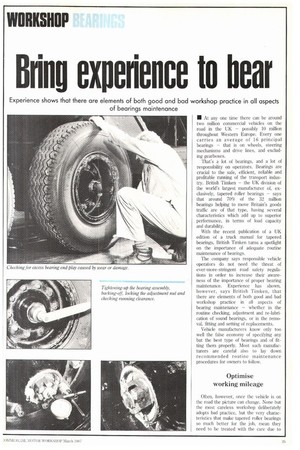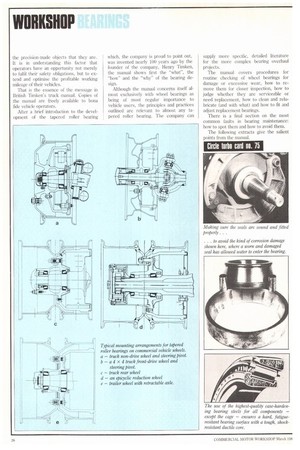Bring experience to bear
Page 101

Page 102

If you've noticed an error in this article please click here to report it so we can fix it.
Experience shows that there are elements of both good and bad workshop practice in all aspects of bearings maintenance
• At any one time there can be around two million commercial vehicles on the road in the UK — possibly 10 million throughout Western Europe. Every one carries an average of 16 principal bearings — that is on wheels, steering mechanisms and drive lines, and excluding gearboxes.
That's a lot of bearings, and a lot of responsibility on operators. Bearings are crucial to the safe, efficient, reliable and profitable running of the transport industry. British Timken — the UK division of the world's largest manufacturer of, exclusively, tapered roller bearings — says that around 70% of the 32 million bearings helping to move Britain's goods traffic are of that type, having several characteristics which add up to superior perfomiance, in terms of load capacity and durability.
With the recent publication of a UK edition of a truck manual for tapered bearings, British Timken turns a spotlight on the importance of adequate routine maintenance of bearings.
The company says responsible vehicle operators do not need the threat of ever-more-stringent road safety regulations in order to increase their awareness of the importance of proper bearing maintenance. Experience has shown, however, says British Timken, that there are elements of both good and bad workshop practice in all aspects of bearing maintenance — whether in the routine checking, adjustment and re-lubrication of sound bearings, or in the removal, fitting and setting of replacements.
Vehicle manufacturers know only too well the false economy of specifying any but the best type of bearings and of fitting them properly. Most such manufacturers are careful also to lay down recommended routine maintenance procedures for owners to follow.
Optimise working mileage
Often, however, once the vehicle is on the road the picture can change. None hut the most careless workshop deliberately adopts had practice, but the very characteristics that make tapered roller bearings so much better for the job, mean they need to be treated with the care due to the precision-made objects that they are. It is in understanding this factor that operators have an opportunity not merely to fulfil their safety obligations, but to extend and optimise the profitable working mileage of their vehicles.
That is the essence of the message in British Timken's truck manual. Copies of the manual are freely available to bona fide vehicle operators.
After a brief introduction to the development of the tapered roller bearing which, the company is proud to point out, was invented nearly 1(X) years ago by the founder of the company, Henry Timken, the manual shows first the "what", the "how" and the "why" of the bearing design.
Although the manual concerns itself almost exclusively with wheel bearings as being of most regular importance to vehicle users, the principles and practices outlined are relevant to almost any tapered roller bearing. The company can supply more specific, detailed literature for the more complex bearing overhaul projects.
The manual covers procedures for routine checking of wheel bearings for damage or excessive wear, how to remove them for closer inspection, how to judge whether they are serviceable or need replacement, how to clean and relubricate (and with what) and how to fit and adjust replacement bearings.
There is a final section on the most common faults in bearing maintenance: how to spot them and how to avoid them.
The following extracts give the salient points from the manual.
















































































































